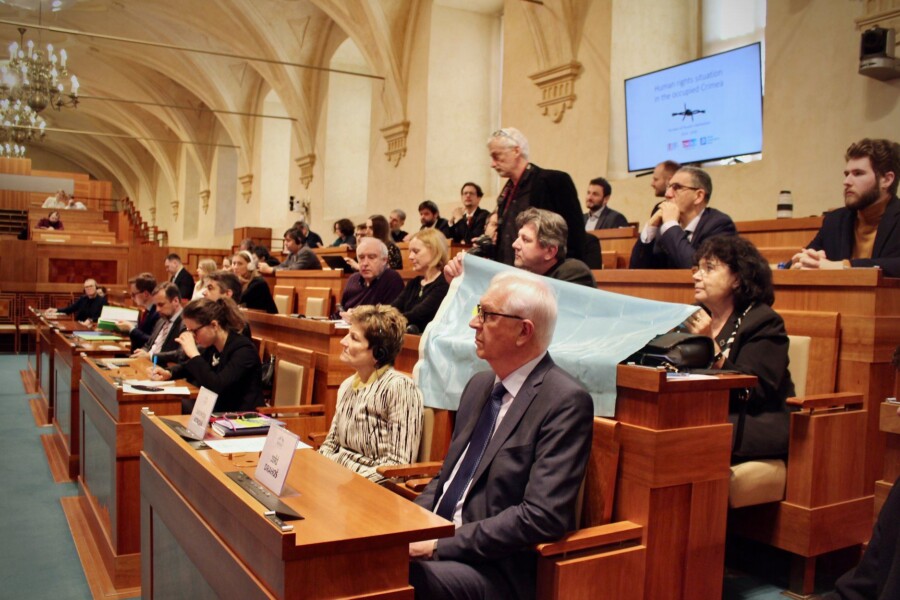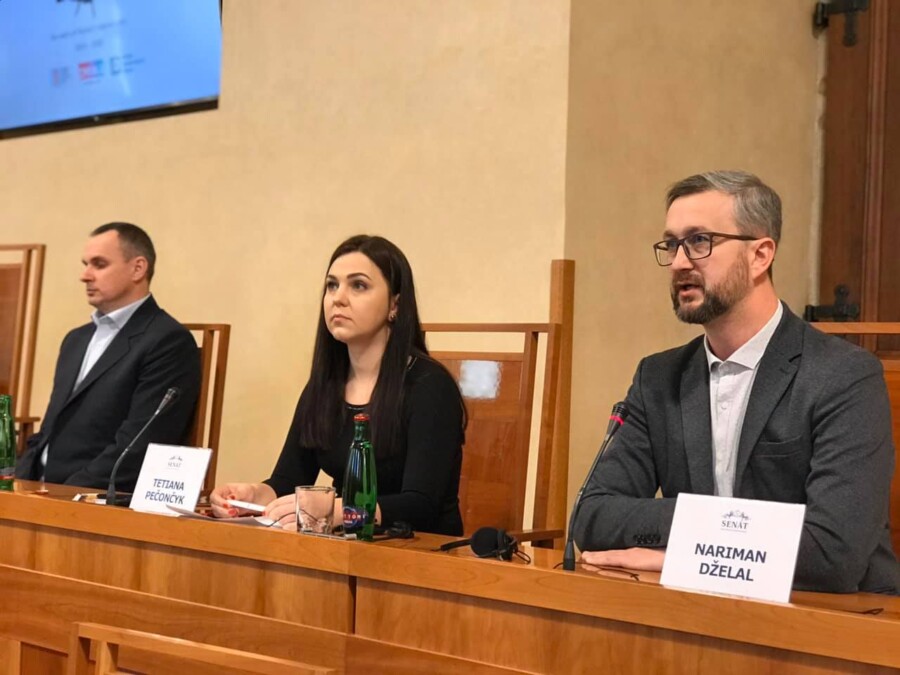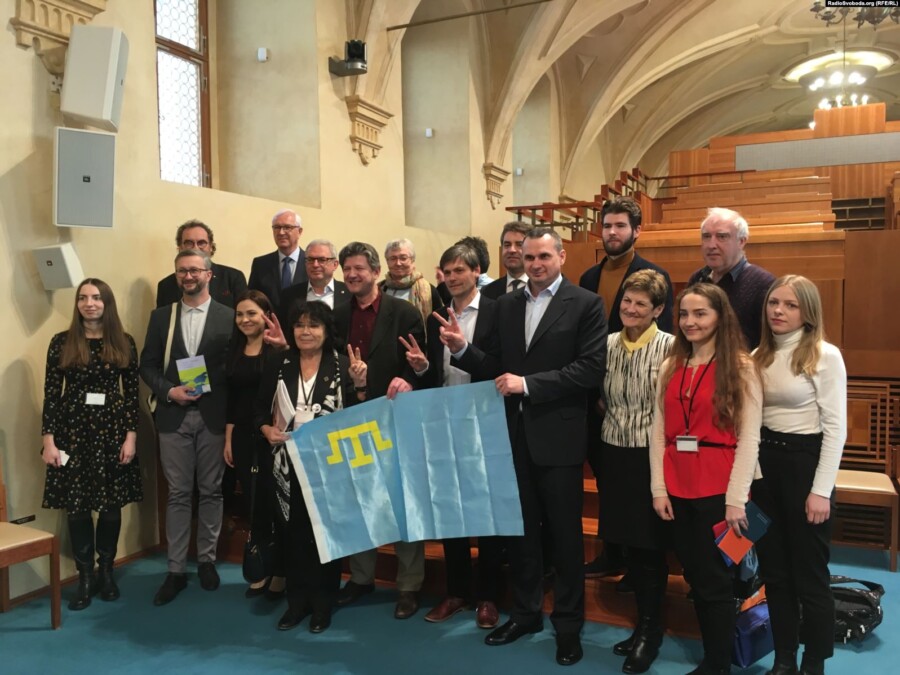A hearing on Crimea took place in the Czech Senate
A seminar on the situation with human rights in the occupied Crimea took place in the upper chamber of the Czech parliament on March, 5th.

A former political prisoner of Kremlin Oleg Sentsov, Deputy Chairman of the Mejlis of Crimean Tatar people Nariman Dzhelyal and the head of Human Rights Center ZMINA Tetiana Pechonchyk were among the speakers. The discussion was moderated by David Stulík, former press-officer for the EU delegation to Ukraine.
The seminar, taking place in the Waldstein Palace of the Czech Senate, gathered an audience of around fifty individuals: aside from the Czech senators there were diplomats of other countries, representatives of the Ukrainian Embassy, Czech human rights defenders, civil activists and journalists. They attended to get a firsthand education on what is the situation with human rights in the occupied Crimea.
The chairperson of the Committee on Education, Science, Culture, Human Rights and Petitions of the Czech Senate Jiří Drahoš provided the opening speech.
Deputy Chairman of the Mejlis of the Crimean Tatar people Nariman Dzhelyal explained in detail that Crimean Tatars became the most persecuted community in Crimea. They are repressed both as political opponents of the occupation and as representatives of religious communities that Russia believes are terrorist.
According to Dzhelyal, every kind of human rights violation that is happening in Russia is also happening in the occupied Crimea, but in Crimea it is amplified many times in its scale. These are fabricated accusations of espionage, terrorism and extremism that result in lengthy jail time sentences.
“Russian Federation works on getting Crimeans used to living in a state of confinement, used to perceiving abnormal things like searches and arrests of their neighbors as the new norm. People in Crimea now say: “If no one raided your home by 7 am, you are going to have a good day”. – said Dzhelyal.
Nariman Dzhelyal pointed out the shrinking of space for fundamental rights and freedoms in Crimea: “From 2014 on I personally have been unable to hold a single public event, because the authorities refuse to permit those under different pretexts. We cannot hold even children’s competitions because the venues owners come under pressure. Conducting cultural or human rights protecting activities becomes impossible if you are not loyal to the authorities”.
Oleg Sentsov reminded the audience that around one hundred individuals remain detained as political prisoners in Russian Federation, while Tetiana Pechonchyk underlined that among them 68 are Crimean Tatars. 207 children have been left without their fathers. Among them 10 have never seen their fathers because they were born after the arrests.
Sentsov said that Russian Federation continues persecuting activists in order to maintain the atmosphere of fear on the peninsula. This is what happened to Reshat Ametov, an ethnic Crimean Tatar who spoke against Russia’s occupation of Crimea and was tortured to death. According to Oleg Sentsov, only pressure on Vladimir Putin and eventually a change of regime in Russia may lead to changes in Crimea.

“You should not expect Putin’s regime that unlawfully arrests and imprisons our citizens to willfully release them. This should be mentioned and the release of the illegally detained should be demanded at all platforms.” – said Oleg Sentsov, who himself spent five years in Kremlin’s prisons.
Supporting Sentsov’s words, Tetiana Pechonchyk, a human rights defender of ZMINA announced that as the meeting was taking place in the Senate, the list of political prisoners in Crimea increased by one more person. A court in the occupied Crimea, under Kremlin’s control, sentenced to six years of prison Serhiy Filatov, a member of the Jehovah’s Witnesses community that is banned in Russia. This way the number of Crimean Ukrainians, detained in politically motivated cases, grew to 89.
Tetiana Pechonchyk told about the most important developments in Crimea, in particular about the changes in demographic composition of the peninsula, about deportation and about militarization of social life. She also described the absence of possibility for the independent media to function. Tetiana provided the examples of journalist Taras Ibrahimov and of photographer Alina Smutko, who were banned from entering Crimea. Pechonchyk also reminded of the cases Server Mustafayev, the coordinator of Crimean Solidarity movement and of Emir Usein Kuku, the human rights defender whose trials are happening in Russian courts.
At the end of their notes, the Ukrainian visitors underlined that the most important thing for Ukraine is that the world does not forget it became a victim of Russia’s aggression and that Ukrainian citizens are captives of the occupants and their rights are violated in numerous ways. On top of that they called for pressuring Russia to release political prisoners, for supporting their families, for maintaining sectoral sanctions against Russian Federation and for imposing personal sanctions against individuals responsible for gravest violations of human rights and of international humanitarian law in Crimea.
The attending Czech senators, members and leaders of the Committee on Education, Science, Culture, Human Rights insisted that their own experience of dealing with totalitarian regimes obliges them to exercise solidarity with Ukraine and Ukrainian citizens who remained in occupied Crimea.

The seminar was organized by the Committee on Education, Science, Culture, Human Rights and Petitions of the Czech Senate.
A press conference featuring the head of the Committee on Education, Science, Culture, Human Rights Jiří Drahoš, a fellow MP Marek Hilšer and Oleg Sentsov took place right after the seminar.
Materials of Olena Ivantsiv and Radio Liberty were used in preparation of this publication.
If you have found a spelling error, please, notify us by selecting that text and pressing Ctrl+Enter.















